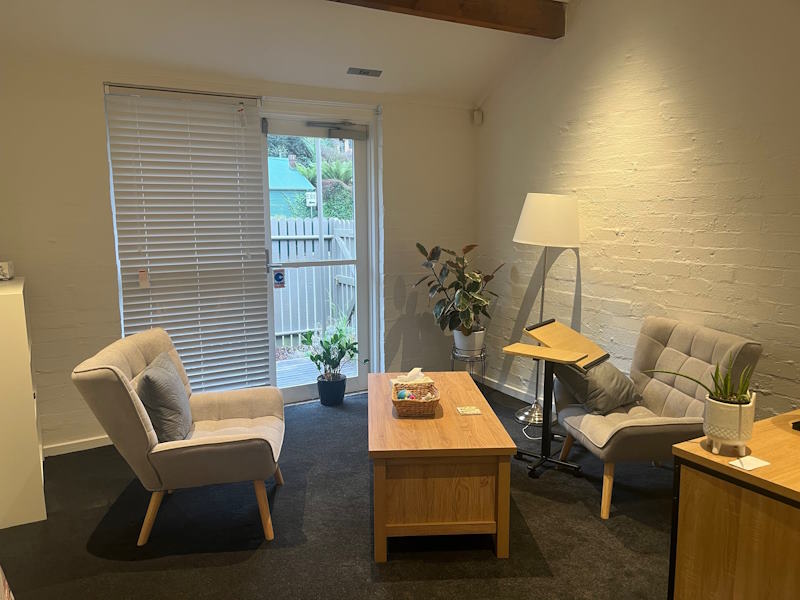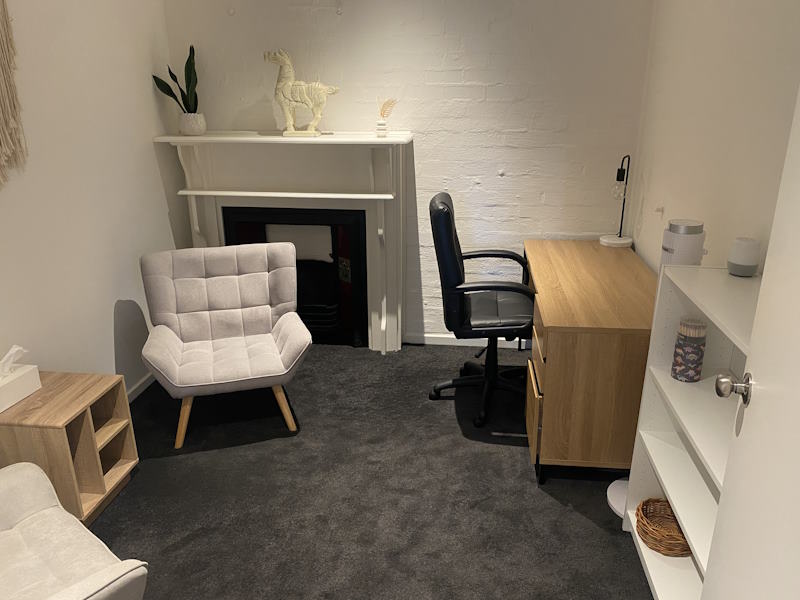


Empathy | Understanding | Change
Aspect Clinic was established to provide affordable, evidence based psychological intervention, and now provides services to the communities in Olinda.
Aspect Clinic prides itself on being a small service where patients are a human being, not just a referral. We take a holistic approach, and understand that many factors, including financial stress, and interpersonal conflict can all impact on your mental health.
Our Team
Services
Empathy | Understanding | ChangeTherapy
 Psychologists at Aspect Clinic provide individual therapy sessions. Our psychologists do not provide relationship counselling, but from time to time and with your permission, we may ask a significant other (most commonly a spouse or parent, depending on circumstances) to join us to assist with your individual work.
Psychologists at Aspect Clinic provide individual therapy sessions. Our psychologists do not provide relationship counselling, but from time to time and with your permission, we may ask a significant other (most commonly a spouse or parent, depending on circumstances) to join us to assist with your individual work.
Our psychologists are trained in a range of evidence-based modalities, including cognitive-behavioural therapy, Acceptance and Commitment Therapy, mindfulness-based approaches, and schema therapy.
Andrew has completed two years training (intermediate-level) in Somatic Experiencing. You can read more about this approach here.
Aspect Clinic offers in clinic appointments, as well as telehealth (video) and phone appointments. Telehealth can be a fantastic alternative, especially when logistical issues make it difficult to make it into the clinic and can be used instead of cancelling an appointment.
Assessments
Aspect Clinic can provide assessments for primary school-aged children, secondary school children, and adults. We assess for cognitive and educational strengths and weaknesses, Autism, and ADHD. We utilise a range of cognitive, educational, and neurodevelopmental assessments including the WISC/WAIS, WIAT, Vineland-3, CARS, Vanderbilt and ASRS. We also use mental health screening tools such as the CBCL, DASS-21, and PCL-5.
At the end of the process, you will be provided with a comprehensive written report, including recommendations, and you will attend a feedback session where your psychologist will go through the report with you.
Children
What is a cognitive assessment?
A cognitive assessment is intended to help you and your child understand your child's cognitive abilities, including strengths and weaknesses, across several areas including language, memory, executive functioning, visuospatial reasoning, and attention. When combined with an educational we can also explore and diagnose learning difficulties that may be interfering with academic performance or contributing to behavioural difficulties and challenges. Our neurodevelopmental assessments provide an opportunity to explore cognitive strengths and weaknesses while also assessing for symptoms of ADHD and autism.
At Aspect Clinic we also include mental health assessments with all of our assessment packages to understand all the factors that may be influencing your child's cognitive abilities and learning capacity.
How would my child benefit?
Cognitive assessments provide many benefits for you and your child including:
- Increased understanding of cognitive and learning abilities
- Specifically tailored recommendations and strategies to support learning and everyday life
- Providing support for NDIS or school funding (if eligibility criteria are met)
Adults
What is a cognitive assessment?
A cognitive assessment is intended to help you understand your cognitive abilities, including strengths and weaknesses, across several areas including language, memory, executive functioning, visuospatial reasoning, and attention. Our neurodevelopmental assessments provide an opportunity to explore cognitive strengths and weaknesses while also assessing for symptoms of ADHD and autism.
At Aspect Clinic we also include mental health assessments with all of our assessment packages to understand all the factors that may be impacting your cognitive abilities and everyday life.
How would I benefit?
Cognitive assessments can provide many benefits including:
- Increased understanding of cognitive and learning abilities
- Specifically tailored recommendations and strategies to support everyday life
- Providing support for NDIS funding (if eligibility criteria are met)
What to expect
Assessments for both children and adults are typically completed in stages. An initial intake phone call is conducted by our admin staff, who will then discuss with the clinicians the suitability of the assessment request. You will then be booked for an initial interview with a psychologist or placed on our waitlist. Typically, the assessment process is as follows:
- Initial interview: this is primarily background and information gathering
- Assessment session(s): more than one session may be required, depending on the type of assessment
- Report writing
- Feedback session and report provision
If during the course of the assessment the psychologist believes that further assessment is required, this will be discussed with you (as client or parent) before proceeding further.
Supervision
 Dr Andrew Telley is a board approved supervisor. He provides supervision on an individual and group basis. Andrew works primarily from a cognitive framework and supervision is provided from this perspective. He is available to supervise provisional psychologists on placement, as well as registrars working towards endorsement in clinical psychology.
Dr Andrew Telley is a board approved supervisor. He provides supervision on an individual and group basis. Andrew works primarily from a cognitive framework and supervision is provided from this perspective. He is available to supervise provisional psychologists on placement, as well as registrars working towards endorsement in clinical psychology.
Supervision is an important part of professional development as a psychologist. Supervision should be approached in different ways based on each individual's career stage. Andrew aims to provide a safe and supportive environment that encourages each supervisee to explore and develop their own therapeutic approach, style, and identity.
Please speak with admin to arrange a time where you can discuss with Andrew your supervision needs.
Frequently Asked Questions
Some common questions we get asked are listed below.
If you can't find an answer, simply ask, we're here to help.
Cognitive-behavioural therapy is an evidence-based psychological intervention. It seeks to empower individuals in moments of stress and crisis to better understand their distress and to make calmer, clearer decisions.
Cognitive-behaviour therapy recognises that our thoughts and beliefs can have a powerful impact on our feelings and behaviours.
It can help to think about the process like this:
- An event happens
- We feel a certain way about it, based on our thoughts and beliefs
- We react based on how we feel
The cognitive approach seeks to intervene between stages two and three, between our automatic reaction to a situation and our response to it. It's a tricky process and it takes time to master, however the results can be powerful.
- An event happens
- We feel a certain way about it, based on our thoughts and beliefs
- We recognise the feeling and decide if it's appropriate
- We react to the event in the way that we choose to
Mindfulness-based cognitive therapy is a type of cognitive therapy. Mindfulness can be defined as the awareness that emerges through paying attention on purpose, in the present moment, and non-judgmentally to the unfolding of experience. In other words, mindfulness is about being aware of what we are thinking, feeling, doing, and experiencing right now - often, we aren't really paying attention to what is happening around us, but rather, we're thinking about what has happened in the past, what might happen in the future, or just daydreaming about something else altogether. Mindfulness can help to decrease emotional reactivity, increase cognitive flexibility, and improve stress tolerance.
Being mindful in the present moment isn't easy - particularly when our emotional reactions threaten to overwhelm us. If it was easy, we'd all do it and the world would be a much easier place to negotiate. Mindfulness is a skill that can be learnt, and is a central tenet of many psychological therapies.
The human brain is incredibly complex, as is the world around us. As we grow and develop, we learn many ways of responding to the world that may be helpful, but we also learn many ways of responding to the world that may be unhelpful. It's often hard to tell the difference, especially in the heat of the moment.
Unhelpful ways of thinking can be a bit like wearing glasses - not prescription glasses, but more like glasses that warp and distort our perceptions of the world. Sometimes, things can look scary or overwhelming through these warped lenses and we can forget what the world actually looks like.
This is where cognitive-behaviour therapy can be helpful. It reminds us that what we think isn't always realistic or flexible, and that learning different, more helpful ways of thinking can be beneficial for our mental health.
The short answer is that it varies from person to person. Changing how we think and behave takes effort. However, through practice and guidance, meaningful changes can be made.
Yes, absolutely! Emotions like anger, sadness, fear, and disgust are adaptive and can help us to negotiate a complex world. Emotions are essentially data processing shortcuts. For example, if you come across a tiger in the jungle, fear helps you to run away quickly. Emotions also have a communicative value. For example, sadness can help you to elicit care from others, and anger can show people that you need a bit of space. So there's plenty of room for all sorts of emotions in our lives. However, the question that we ask is: Is this emotional response appropriate and proportional, and is it severe, frequent, and/or long lasting? For example, if you are really sad most of the day for more than two weeks, you may be experiencing an episode of depression.
To understand your thinking style, behavioural patterns, and emotions, we need to understand you and your background. To do that, we'll sit and talk and really examine things - particularly the things that seem obvious and that have gone unquestioned.
Once we have collaboratively explored the problem and figured out some of the underlying thought processes and behavioural patterns that may be precipitating and maintaining your mental health difficulties, we'll formulate an intervention strategy. Over weeks and perhaps months, we'll fine-tune it to suit your individual needs and challenges.
"Feeling down" and the clinical disorder "depression" are different things, and similarly, "being apprehensive about something" is not the same as an anxiety disorder. Rather than think of "normal" versus "disordered" functioning, it is often more helpful to think about symptoms and the impact these symptoms might have on functioning.
Many people find ways to mitigate the stress caused by negative emotions, often in unhelpful ways. Unaddressed negative emotions can lead to relationship difficulties, or impact on an individual's ability to function in work, study, or family life.
Cognitive-behavioural interventions can be effective in addressing a range of problems, including:
- Depression
- Anxiety
- Trauma
- Insomnia
- Unhealthy coping strategies
- Eating problems
- Personality disorders
- Psychosis
- Stress
- Relationship difficulties
- Adjustment problems
- Chronic pain
Fees & Rebates
Mental Health Care Plans
The most affordable way to access psychological therapy is through a Mental Health Care Plan (MHCP), which can be prepared by your GP. This care plan allows for a limited number of sessions per year to attract a Medicare Rebate. Before booking your first appointment, talk to your GP about your eligibility for a MHCP. Your GP will decide if a MHCP is appropriate for you, given your health care needs and circumstances. Even if you are not eligible for a MHCP, you can still make an appointment as a private patient.
We are a pay on the day service and all payments including gap payments are expected to be paid either prior to or immediately following your appointment.
We are able to store your credit card details on file using an encrypted format, which allows us to process payments once your appointment has taken place. If this is your preferred method of payment then let us know and we can send you an electronic form to complete.
If you have a current mental health care plan we can process your Medicare rebate once payment has been received.
From 1st January 2025, fees, rebates and out of pocket expenses for standard (i.e. 50 minutes) therapeutic consultations are as follows:
| Fees | Rebate | Out of Pocket Expense | |
|---|---|---|---|
| Clinic Director | $260.00 | $141.85 | $118.15 |
| Clinical Psychologist | $240.00 | $141.85 | $98.15 |
| Senior Psychologist | $220.00 | $96.65 | $123.35 |
| Clinical Registrar / General Psychologist | $200.00 | $96.65 | $103.35 |
| Provisional Psychologist | $100.00 | $0.00 | $100.00 |
General and Clinical Psychologists are able to accept patients with accepted TAC, WorkCover, and DVA claims as well as self-managed and plan-managed NDIS participants. If seeing a Clinical Psychologist there will be an out of pocket expense under the above schemes (excluding NDIS). It is dependent on your claim as to how many psychology appointments you are entitled to.
A cancellation fee may be payable if you cancel or reschedule your appointment less than two business days prior to your appointment. Information on our cancellation policy can be found here.
From time to time your psychologist may request a longer consultation in order to complete additional work (for example letters of support, completing forms, and consultation with other health practitioners). You can also request a longer therapeutic consultation if you wish. The specific fee will vary depending on the complexity of the request and the time it is likely to take to complete. You should discuss these fees with your psychologist prior to a longer appointment being booked.
Assessments
Aspect Clinic offers a range of assessment packages for children (aged 7 to 16 years) and adults (16 years and above). The packages we provide include:
- Cognitive Assessments
- Cognitive and Educational Assessments
- Autism Assessments
- Cognitive and ADHD/Autism Assessments
Please speak with admin regarding pricing for our assessment packages.
View the Department of Health Fact Sheet for Patients.
Information on Informed Consent can be found here.
Information on our Privacy Policy can be found here.
Resources & Links
Below is a small sample of the many online resources that provide information and support for individuals who may be experiencing mental health difficulties. If you can't find what you're looking for or aren't sure where to begin, please contact us and we'll point you in the right direction.
Orygen Youth Health
Visit orygen.org.au or oyh.org.au
Kids Helpline
Visit kidshelpline.com.au
MensLine Australia
Visit mensline.org.au
Eating Disorders Victoria
Visit eatingdisorders.org.au
Anxiety Disorders Association of Victoria
Visit adavic.org.au
Outer East Melbourne Adult Mental Health Services
PANDA (Perinatal Anxiety & Depression Australia)
Visit panda.org.au
Child & Youth Mental Health Service (CYMHS)
Relationships Australia
Visit relationships.org.au
EDVOS (Family Violence Service for Women and Children)
Visit edvos.org.au
DVRCV (Domestic Violence Resource Centre Victoria)
Visit dvrcv.org.au







